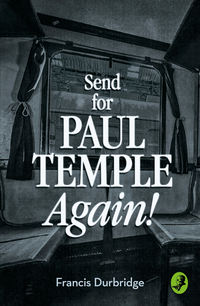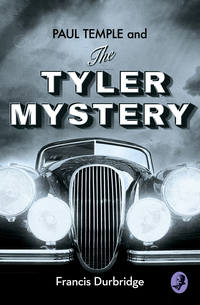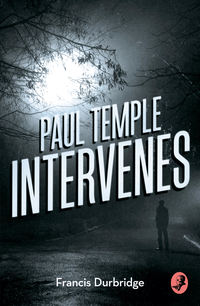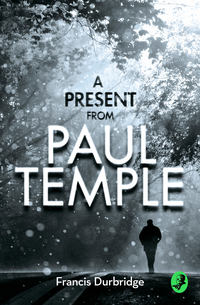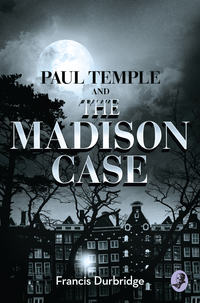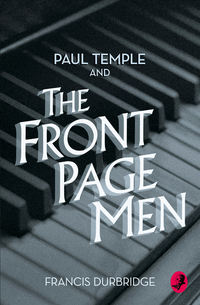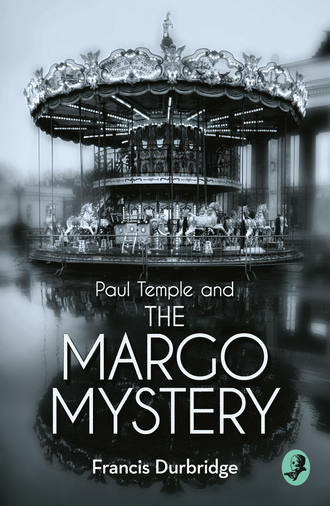
Полная версия
Paul Temple and the Margo Mystery

FRANCIS DURBRIDGE
Paul Temple and the Margo Mystery


An imprint of HarperCollinsPublishers
1 London Bridge Street
London SE1 9GF
www.harpercollins.co.uk
First published in Great Britain by
Hodder & Stoughton 1986
Copyright © Francis Durbridge 1986
All rights reserved
Francis Durbridge has asserted his right under the Copyright,
Designs and Patents Act, 1988 to be identified as the author of this work
Cover design © HarperCollinsPublishers Ltd 2015
Cover image © Shutterstock.com
A catalogue copy of this book is available from the British Library.
This novel is entirely a work of fiction. The names, characters and incidents portrayed in it are the work of the author’s imagination. Any resemblance to actual persons, living or dead, events or localities is entirely coincidental.
All rights reserved under International and Pan-American Copyright Conventions. By payment of the required fees, you have been granted the non-exclusive, non-transferable right to access and read the text of this e-book on screen. No part of this text may be reproduced, transmitted, down-loaded, decompiled, reverse engineered, or stored in or introduced into any information storage and retrieval system, in any form or by any means, whether electronic or mechanical, now known or hereinafter invented, without the express written permission of HarperCollins.
Source ISBN: 9780008125769
Ebook Edition © November 2015 ISBN: 9780008125776
Version: 2016-04-29
Contents
Cover
Title Page
Copyright
CHAPTER I: The Coat
CHAPTER II: Dead Lucky
CHAPTER III: A Change of Mind
CHAPTER IV: Bill Fletcher’s Story
CHAPTER V: Breakwater House
CHAPTER VI: The Late Tony Wyman
CHAPTER VII: A Time to Worry
CHAPTER VIII: The Visitor
About the Author
Also in This Series
About the Publisher
CHAPTER I
The Coat
Thanks to a cab driver with the nerve of a Grand Prix racer Paul Temple caught the morning flight from New York to London by the skin of his teeth. As a Concorde passenger he received VIP treatment and was hustled through the departure formalities. Less than an hour after leaving his hotel on Fifth Avenue he was in his window seat watching John F. Kennedy Airport drop rapidly away as Concorde soared towards her cruising height. Some other passengers must have cut things even finer, for the seat beside him had remained empty.
He listened patiently to the stewardess going through the familiar demonstration of the emergency equipment, waiting for the illuminated sign to be switched off so that he could unfasten his safety belt. As the Captain finished his reassuring announcement he made his way forward to put through the telephone call to London which he had booked on boarding.
One of the stewardesses, who had put on her in-flight overall, stood aside to let him pass. Her smile was not purely automatic. It was a pleasure to see someone whose style matched that of the aircraft. Temple, with his well-cut clothes, tall build and clean-cut features looked as British as the Rolls-Royce engines that were driving them through the air faster than a bullet leaving a rifle.
Temple’s decision to return home had been made last thing the evening before and his wife Steve would need some warning that he would be arriving two days early.
When he returned to his seat he found that a youngish man had ensconced himself in the empty place. He smiled apologetically and swung his knees sideways to let Temple pass.
‘I hope you don’t mind. I saw that this seat was empty.’ The accent was American, but suggestive of Boston rather than the Bronx.
‘Not at all,’ Temple said, removing The New York Times from his seat before he sat down. ‘I thought someone must have missed the plane.’
‘Oh, I have a seat further back. I flew in from California overnight and had a couple of hours’ wait at Kennedy. Nice to think we’ll be in London just about the same time as we left New York. Your Concorde sure is a fantastic aircraft.’
‘Yes, and this new telephone link by satellite is a great advantage. I’ve just been talking to my wife.’
‘Mrs Temple doesn’t come on these trips with you?’ The man laughed when he saw Temple’s surprise. ‘You don’t remember me? My name’s Langdon. Mike Langdon. We met in Hollywood, Mr Temple.’
‘Did we?’ Temple turned to look at his neighbour more closely. He was wearing a lightweight suit and his confident manner was that of a hard-thrusting businessman who does not mind cutting a few corners to achieve his targets. His dark curly hair was cut close to his head and he must have found time to shave during his wait at Kennedy, for his cheeks were smooth. Temple could often tell as much about a person from his hands as from his facial features, but Langdon held his hands firmly folded in his lap as if determined to keep them strictly under control.
‘You don’t remember?’
‘I’m sorry.’ Langdon was holding his gaze. ‘I’ve met so many people during these past weeks—’
‘Yes, of course.’ Langdon smiled, remembering some scene that Temple had forgotten. ‘I was at that party the film people gave you – me and about two hundred others.’
‘Yes.’ Temple smiled in reply. ‘That was quite a party, wasn’t it?’
‘It sure was.’
‘Are you in the film business, Mr Langdon?’
‘No.’ Langdon glanced down to adjust the cuffs of his shirt, making sure that they protruded just one quarter of an inch. ‘I’m with a publishing firm in New York, Talbot and Ryder. It’s only a small outfit, but we do very nicely. I’m sorry we don’t have your books on our list, Mr Temple, but I guess we can’t afford the advances the big boys put up. How did the lecture tour go?’
‘Oh, very well, thank you, but it was a bit wearing at times.’
‘I’ll bet!’ Langdon agreed emphatically. ‘Our authors hate ’em. Still, they’re first-rate publicity.’
The conversation was interrupted as two stewardesses came along with the Concorde ration of vintage champagne. Langdon shook his head and insisted on a Scotch on the rocks.
‘Is this your first trip to Europe?’ Temple enquired, savouring his Veuve Clicquot. The aircraft had climbed through cloud and was now flying over a cotton-wool landscape under blue skies.
‘No. I’ve been over many times before. I was in Paris two weeks ago.’ Langdon turned sideways in his seat, swirling the ice round in his glass. Temple sensed that he was now about to learn why Langdon had wanted to sit beside him. ‘Mr Temple, have you heard of a young man called Tony Wyman?’
‘No, I don’t think so. Should I have done?’
‘Well, I understand he’s fairly well-known in your country. He’s a pop singer.’
‘Tony Wyman?’ Temple shook his head. ‘Is he a friend of yours?’
‘No.’ Langdon gave a short laugh. ‘And I doubt whether he’ll turn out to be one, either.’ He eased a little closer and leant his forearm on the armrest between them. ‘Mr Temple, I’ve got quite a problem on my hands and I’d sure like to talk about it. Is that okay by you?’
‘Why, yes.’ Temple, who was used to this kind of approach, smiled wryly. ‘Go ahead.’
‘About two years ago my firm was taken over by an Englishman called George Kelburn. If you don’t know Kelburn personally, you’ve probably read about him.’
‘Yes, I’ve heard of Kelburn. He’s a north-country chap, reputed to be worth millions.’
‘That’s right. Well, when Kelburn took our firm over he made me the Number One boy. He’s a blunt, ruthless sort of guy, but we’ve always got on well together.’
Temple thought Langdon looked as if he was well able to handle a blunt, ruthless sort of guy.
‘He’d be a good deal older than you?’
‘Yes, he’s about sixty, maybe sixty-two or three. I’m not sure.’
Langdon screwed his eyes up against a sudden dazzle. As the plane banked the sunlight was reflected into the cabin off its gleaming wing.
‘Go on, Mr Langdon,’ Temple prompted.
‘Well, Kelburn’s first wife died some years ago and he married again – a woman a lot younger than himself. He has a daughter, Julia, by his first wife. Julia’s twenty-one – young, attractive and hopelessly spoilt.’
‘Not an unusual story,’ said Temple with a smile.
‘No, I suppose not, but – well, to cut a long story short, Julia’s got herself tangled up with this night-club singer, Tony Wyman, and she’s told her father that she intends to marry the guy.’
‘And Kelburn’s against it?’
‘Against it?’ Langdon looked deadly serious. ‘Kelburn’s going to stop that marriage if it’s the last thing he does.’
‘Yes, but – how do you fit into all this, Mr Langdon? If you’re just a business associate of Kelburn’s…’
‘That’s just the point,’ Langdon interrupted, with exasperation. ‘I don’t fit into it! But Kelburn sent me an SOS, and there was nothing I could do about it.’
‘You mean, he wants you to try and influence her to…’
‘Exactly! Julia and I have always got on well together, so he wants me to talk to the kid and try to persuade her to throw the boyfriend over.’
‘Do you think you’ve got much chance?’
‘None.’ Langdon shook his head morosely. ‘I’ve got no special influence with her, and according to all accounts she’s nuts about this Tony Wyman.’
‘You seem to be in quite a spot.’
‘You can say that again! Well, you’re used to other people’s troubles, Mr Temple! What would you do if you were in my shoes?’
Temple had warmed to Langdon, whose frank helplessness was rather disarming. The problem was a pleasantly banal one, after the murders and other vicious crimes which he was usually called on to solve. ‘Frankly, I don’t know what I’d do.’
‘If I refuse to help Kelburn he’ll put me on the spot businesswise – there’s no doubt about that, I know Kelburn. On the other hand, if I get mixed up in it and make a mess of things, which is more than likely, it isn’t going to do me any good either.’
A stewardess was moving back along the cabin, collecting the empty glasses. Temple finished his champagne and placed the glass on the folding table ready for her.
‘And how does Kelburn’s wife react to all this?’
‘Oh, Laura takes the point of view that Julia’s twenty-one and she’ll do what she likes, anyway.’
‘I see.’
‘This whole business has turned up at a very awkward moment, so far as I’m concerned. I’ve had a hectic time just lately – been in ten countries in two months, and right now I’m ready for a holiday, not a first-class family squabble.’
‘Well, there’s no point in anticipating trouble, Mr Langdon,’ Temple told him reassuringly. ‘Perhaps when you get to London you’ll find the situation has straightened itself out.’
‘I certainly hope so.’
‘Anyway, I’m in the ’phone book. If you feel I can help you at any time, give me a ring.’
‘Well, now, that’s very kind of you, Mr Temple.’ Obviously delighted, Langdon stretched out his free hand and insisted on shaking Temple’s. ‘I do appreciate it, sir. I certainly do!’
The stewardess leant across him to pick up Temple’s glass. ‘Will you be returning to your seat, sir?’ she enquired, ‘or remaining here? We shall shortly be serving lunch.’
‘Oh, I’d better get back to my own seat,’ Langdon said, rising. ‘And thanks again, Mr Temple. I may take you up on that offer.’
Steve returned to the flat at about two thirty after lunching in the West End. The flat always seemed so empty when Temple was away, and she began to wish she had accepted her friend’s invitation to go and see the new exhibition at the Hayward Gallery. She went into the bedroom and unpacked the new dress she had bought. She wanted to surprise Paul with something really smart when he came back from his lecture tour. As she held it against herself and studied the effect in the long mirror she decided that a new pair of shoes and a handbag were essential to match it. Rather than hide it away in the long cupboard, she hung it on the back of the door where she could see it and wandered aimlessly into the sitting-room.
The trees in Eaton Square were beginning to bud and the city birds had already started to prophesy spring. A couple of the early daffodils she had bought to brighten the place up had begun to wilt. She had picked them out of the vase and was throwing them into the waste-paper basket when Charlie came in. He was carrying a cup on a tray.
‘Thought you might like a cup of coffee.’
‘Oh, thank you, Charlie. Just put it down on the table.’
Charlie was the Temples’ driver, cook, odd-job man and watchdog. His familiarity sometimes verged on impertinence but he was loyal and faithful as a spaniel. The forty-year-old Cockney had been with them for more years than any of them cared to remember and had his own sitting-room and bedroom beyond a door whose threshold neither Paul nor Steve would have presumed to cross. The only disadvantage about Charlie was his unfortunate lack of dress sense. Steve tried not to show her disapproval of the lumberjack shirt and the too tight check trousers.
‘What time is it, Charlie?’
‘Just gone ’arf past two,’ said Charlie, setting the cup and saucer down on a low table. ‘Cream’s in it already but I didn’t put any sugar, like you said.’
‘Only half past two. How slowly the days go! I thought it was later than that. In New York it must be nine thirty.’
Charlie paused, knowing that she needed company. ‘Yes, I suppose it will. Five hours back. Do you think Mr Temple will have had breakfast yet?’
‘Well, I should hope so, Charlie. He promised to get through his schedule as quickly as possible.’
‘When are you expecting him back, Mrs Temple?’
‘Some time next week, if all goes well.’
Charlie stared sympathetically at her dejected face. ‘I’ll bet you’ll be glad.’
‘That’s the understatement of the year. It seems as if he’s been away for months.’
‘Four weeks and a day.’ Charlie saw the discarded daffodils in the waste-paper basket and went over to pick them up. ‘You know, I can’t understand why you didn’t go with him. You usually—’
‘Have you ever been to America on a lecture tour, Charlie?’
‘No,’ Charlie admitted, after a moment’s thought. ‘Can’t say as I ’ave.’
‘Twenty-two towns in four weeks. That’s not my idea of –’ She stopped as the telephone in the hall began to ring. ‘Oh, see who that is, Charlie, will you? If it’s those people who want to clean our carpets say I’m not in.’
She heard Charlie pick up the telephone and give the number. Almost at once he called: ‘Mrs Temple! Quick! It’s Mr Temple.’
Steve ran to seize the receiver from him. ‘Paul, darling! Where are you?’
‘About thirty thousand feet over the east coast of Canada. I’m on Concorde.’
‘But Paul, how on earth—? I didn’t know you could—’
‘Listen, Steve. How are you?’
‘I’m fine. Looking forward to next week.’
‘I’ve got news for you. I’ve finished my tour early and I’m on my way back. We’re due to land at London Airport at seven fifteen.’
‘Oh, that Concorde! But how are you able to ’phone me? The line’s so clear.’
‘Don’t worry about that. Now, you’ve got the message? I’ll be home tonight.’
‘Seven fifteen at London Airport. Bet your sweet life I’ll be there!’
‘There’s no need to meet me, darling. I can take a taxi.’
‘Just you try and stop me. What’s the flight number?’
‘Just ask for Concorde, Terminal Three. Goodbye, Steve. See you at Heathrow.’
Charlie was alone in the flat at a quarter to eight when the telephone rang. He came out of the kitchen, wiping his hands on the faded blue and white housemaid’s apron he always wore when he was cooking.
‘Mr Temple’s residence.’
‘Is that you, Charlie?’
‘Mr Temple! Where are you?’
‘I’m at the airport. Is Mrs Temple with you?’
‘Why no! I thought she’d be with you, Mr Temple. She left here two hours ago.’
‘Did she take the car?’
‘Yes—the MG Metro.’
‘You’re sure she knew the time and place?’
‘Yes, she knew the time and place all right. She’s been talking about nothing else all afternoon.’
‘I see.’ Temple’s tone was worried. ‘Did she say whether she had any calls to make?’
‘No, but I don’t think she had.’ Charlie was certain that Steve had had no other thought in her mind except to meet her husband. ‘I hope there hasn’t been an accident…’
‘Yes, I hope so too, Charlie,’ Temple said gravely. ‘I’ll see you later.’
‘Very good, sir.’ Unusually subdued, Charlie replaced the receiver.
The homecoming dinner prepared with such care by Charlie had proved to be wasted effort. On arriving back at the flat Temple had declared himself unable to swallow a mouthful after the meal he had eaten on Concorde, and five hours after she had left for the airport there was still neither sight nor sound of Steve. Charlie had salvaged what he could and stored it away in the deep-freeze for some future occasion. He was in his bed-sitter watching the TV commercials that preceded the ten o’clock news when there came a long ring on the doorbell followed by an authoritative rat-tat-tat on the knocker.
Charlie, divested of his apron and wearing a jacket which noticeably failed to match his trousers, went to open it. Of the two men standing on the landing outside he was already familiar with one. Sir Graham Forbes was the kind of Englishman who had been formed by the successive processes of school, university, military service and public office. With his broad shoulders, bristling grey moustache, bushy eyebrows and a certain aura of unshakable confidence he was still impressive enough to attract the glances of women.
‘Good evening, Charlie,’ he said, as one greeting an old friend.
‘Good evening, sir. Mr Temple’s expecting you.’
‘Any news?’ Sir Graham asked, as he stepped into the hall.
‘No, sir. I’m afraid not.’
The heavily built man with Forbes was at least fifteen years younger and of a very different type. He was soberly dressed with a plain tie and well-polished black shoes. Charlie, who was at heart a downright snob, could see at a glance that he had made his way in the world by his own unaided efforts, assisted by no advantages of family or money. Charlie was not endeared by the way those hard eyes swept over him, missing not a detail of his dress and physical features. He had the uncomfortable feeling that he was being checked against some rogues’ gallery that the police officer carried in a computer-like mind.
‘In here, Sir Graham,’ he said, fussing over the taller man and ignoring the other. ‘Mr Temple’s in the sitting-room.’
Temple, who had also been watching the ten o’clock ITV news, half expecting to hear that there had been some horrific pile-up on the M4 between London and Heathrow, switched the set off and came across the room to meet his visitors.
‘Come in, Sir Graham. It’s very kind of you to come at such short notice.’
‘My dear fellow, I’d have got here sooner only I was already half-way home from my club when your message came through. And when Steve is concerned—’
‘I understand there’s no news, Mr Temple,’ the police officer said, anxious to make the point that he too had forsaken hearth and home to accompany Sir Graham.
Temple turned towards him and the eyes of the two men met with mutual appraisal and respect. Raine, of course, had known Temple’s reputation as a criminologist as well as an author, even before the briefing Forbes had given him in the car.
‘No, I’m afraid not.’
‘This is Superintendent Raine, Temple.’ Forbes put a friendly hand on the Scotland Yard man’s shoulder. ‘I don’t think you’ve met before.’
‘No, I don’t think we have. Though I read about your handling of the Belgrave Square siege.’ The two men shook hands, still measuring each other with their eyes. Temple assessed Raine as thorough and methodical but perhaps a little unimaginative. ‘How do you do, Superintendent.’
‘Pleased to meet you, Mr Temple.’
‘Sit down and I’ll get you a drink.’
‘No, no. Don’t worry about drinks.’ Forbes brushed the offer aside, to Raine’s evident disappointment. ‘Temple, tell me, have you checked the hospitals?’
‘I’ve checked every hospital within thirty miles of the airport,’ Temple said wearily. ‘It took me the whole evening.’
Raine had seated himself on the front edge of one of the easy chairs. ‘I understand you found Mrs Temple’s car?’
‘Yes, Superintendent. It was in the car park at the airport. The attendant remembered her arriving – about half an hour before my plane was due. She’d left her coat in the back of the car, so she couldn’t have intended to go much further than the lounge, or maybe the restaurant.’
‘I take it Mrs Temple didn’t leave a note for you, sir, or anything which might…’
‘No. I’ve been through the place pretty thoroughly, and apart from a telephone message there’s nothing – absolutely nothing.’
Forbes, who had taken up his customary position in front of the fireplace with legs astride, asked: ‘What was the telephone message?’
‘It was on the pad upstairs. It simply said: “Tell P.” – which is obviously me – “about L.”’
‘Who’s L, Temple?’
‘I don’t know. But I don’t think it’s important, Sir Graham. According to Charlie, the message was written several days ago.’
‘Well, I’m sorry, Mr Temple,’ Raine commented in his deliberate way, ‘but it looks as if we shall have to face the facts. The only explanation I can see is that your wife’s been waylaid by someone. Now the question is…’
He was interrupted by the ringing of the telephone out in the hall. Temple exchanged a quick glance of hope with Forbes before he went out to pick the receiver up.
‘Hello?’
He could hear the bleep-bleep, indicating that the call was coming from a pay ’phone. There was a clunk as a coin was pushed into the slot. Then Temple heard a man’s voice, muffled but obviously in the same call-box.
‘All right. Go ahead. Talk to him now…’
‘Hello!’ Temple repeated impatiently. ‘Hello, who is that?’
There was a pause, and then: ‘Is that you, Paul?’ The woman’s voice was so weak that he hardly recognised it as Steve’s.
‘Steve! Is that you, Steve?’
‘Paul, can you hear me?’
He could tell from her voice that she was very frightened. ‘Steve, where are you?’
‘Don’t worry, dear.’ Scared though she was, she was trying to reassure him. ‘There’s nothing to worry about…’
‘Yes, but Steve,’ Temple cut in, unable to mask his impatience, ‘where are you speaking from?’
‘I’m…perfectly all right…’
‘Steve, listen!’ Temple was gripping the receiver. ‘There was a man on the ’phone, I heard his voice…Who was it?’
‘Paul, don’t try and…’ Steve’s voice was fading, as if someone were pulling the receiver away from her.
‘Darling, please tell me…Where are you?’
‘Oh, Paul…’ The cry was barely audible. Before Temple could speak again the maddening bleep-bleep had started once more.


